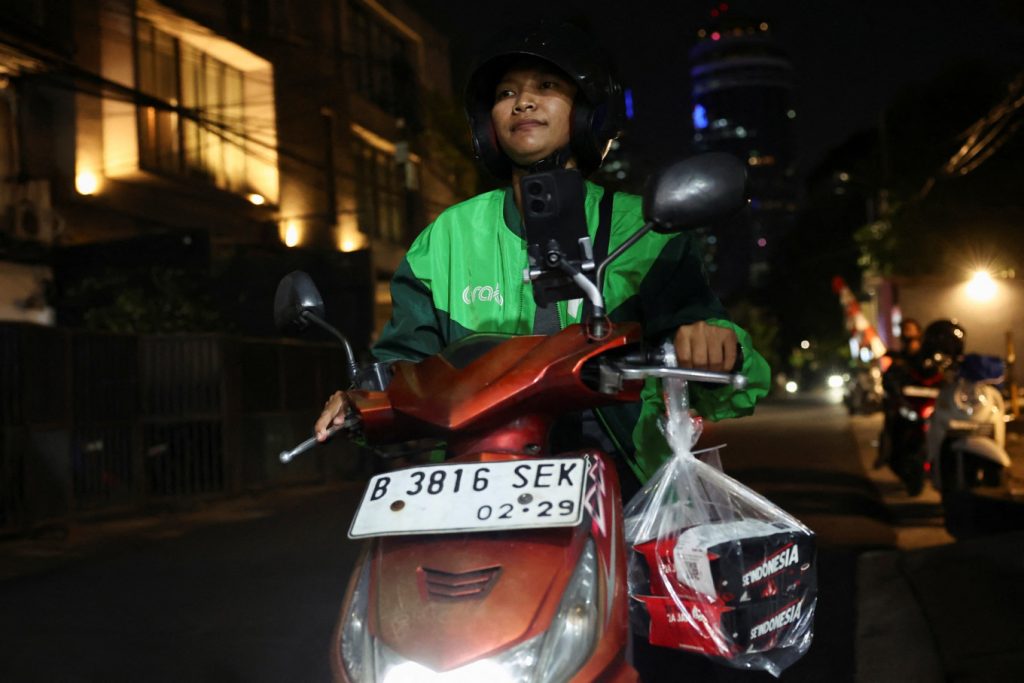Development plans like the Long-term National Development Plan (RJPN) 2025-2045 often frame young people as economic and state instruments, valued for future productivity and conformity to state-approved personas.

Pratiwi Ariyanti, a 38-year-old ojol (online motorcycle transportation driver), rides her motorcycle in Jakarta on Sept. 3, 2025 after picking up food ordered and donated by a customer from overseas in solidarity with the Indonesian protests. (Reuters/Willy Kurniawan)
The late Affan Kurniawan, 21, an ojol (online motorcycle transportation) driver, embodied the precarious tightrope many Gen-Z face. Unable to afford vocational schooling, he became the family’s main breadwinner, navigating gig work, unpredictable income, long hours and little in the way of a safety net. His life ended when he was run over by a police-armored vehicle during a tense demonstration.
He was not an activist, only a worker trying to make a living, caught in the crossfire of state power and pemuda (youth) vulnerability.
Many others killed in the riots or arrested by police were also young, underscoring the precarity of this generation as both victims and targets of state response. Their disrupted lives revealed a stark reality: Indonesia’s pemuda are often left without protection, recognition or agency.
Yet young Indonesians, despite their vulnerability, are central to Indonesia’s future. Their fragility does not diminish their significance; it makes their role in shaping the nation’s path more urgent.
The millennial and Gen Z generations are projected to make up nearly two-thirds of the 2029 electorate. They are no longer just the future; they are the political present. Their votes will determine not only electoral outcomes but also the nation’s trajectory.
By 2045, millennials will be in their 60s and Gen Z in their 30s, and with a population of around 145 million they will form the backbone of Indonesia’s workforce, society and leadership. Numbers alone, however, do not guarantee security or inclusion.
Like Affan, many remain underserved, underrepresented and fragmented. Without action, the demographic bonus could turn into demographic decay marked by inequality, disillusionment and civic disengagement.
Indonesia’s pemuda are not a monolith. They range from professors at world-class universities to those who never finished high school (an estimated 40–45 percent, BPS 2020 Census). Some are urban digital natives, but most are rural young people with limited data access. Many rely on gig work, while diploma holders face mismatched jobs. Some are starting families; others care for parents as the “sandwich generation”.
Compounding these pressures, many faces long-term impacts of stunting, disability, unhealthy lifestyles and mental health challenges. Inequality is further shaped by gender, education, geography and access to technology.
To avoid a demographic bust, Indonesia must foster intra-generational solidarity among pemuda (young people) and cultivate pemuda agency. Intergenerational partnership is also essential.
This generational test is compounded by state practices. Development plans like the Long-term National Development Plan (RPJPN) 2025–2045 often frame pemuda as economic instruments, valued for productivity and conformity to state-approved roles.
Meanwhile, populist programs such as the free nutritious meal program and direct cash transfers offer visibility but not genuine participation or leadership. These approaches limit pemuda to patriotic compliance or labor force projections.
At the same time, civic space is narrowing. Democratic voices are eroded through institutional manipulation and sidelining of dissent, masking overt repression. Recent weeks have seen token elite submission, activists arrested, reform narratives delegitimized, and voices curtailed.
For Indonesia’s path to 2045 to be emas (gold) rather than cemas (anxious), three interwoven pathways must be pursued:
First, foster intra-generational solidarity across diverse pemuda realities. Civic forums, peer-led storytelling and initiatives like the 17+8 Popular Demands or Green Generation show that civic energy exists but needs structural support. Without solidarity, pemuda leadership risks replicating fragmentation.
Second, build civic infrastructure that embeds pemuda agency in daily life. Participation must intersect with survival, from internship and high school certificates for dropouts, to community kitchens under the free meal program and participatory budgeting for rural cooperatives. When relevance and contribution align, civic culture becomes a lived practice.
Third, cultivate intergenerational partnerships rooted in mentorship and value alignment. Senior leaders must act as mentors and collaborators, not gatekeepers.
These pathways form the civic engine that can turn the demographic bonus into equitable prosperity underpinned by democratic practice. Collective efforts across generations can empower those most in need and ensure no one is left behind.
Political structures must evolve to support, not restrict, these solidarities. Senior elites must yield space to participatory frameworks. President Prabowo Subianto will be 83 years old by the end of a possible second term, while most political elites are in their 60s and 70s. Even Vice President Gibran Rakabuming Raka, a millennial, symbolizes dynastic continuity more than generational renewal.
This gulf between rulers and the young majority is not abstract; it claims lives and futures. Affan’s death revealed what official speeches conceal: Millions of young Indonesians remain expendable; their lives reduced to statistics or patriotic symbols.
The outcry that followed was not only about police accountability, but also about a generation’s demand to be recognized as full citizens, not just as instruments of growth or objects of control. For Gen Z, Affan was not an isolated tragedy but a mirror reflecting their daily insecurity.
If Indonesia is to honor his memory, it cannot allow more pemuda to be left behind in precarity. The country’s future will not be secured by armored vehicles or top-down visions, but by building civic and economic pathways that trust young people as coauthors of their destiny.
The question now is whether Indonesia will continue to lose its pemuda to neglect and violence, or finally pivot toward a generation whose agency, solidarity and imagination can redeem the promise of 2045.*
Adi Abidin is a public policy specialist at Kiroyan Partners and a research fellow at Populi Center. The views expressed are personal.
Source: The Jakarta Post, September 18, 2025.
Download the clipping here.



